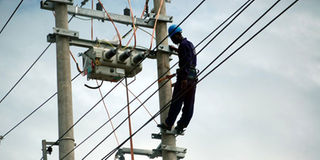Breaking: Autopsy reveals how Cyrus Jirongo died
Premium
Kenya Power to use cash raised from proposed tariffs to build new plants

An employee of Kenya power and lighting company fits the new cement poles with modern transformers that will reduce frequent power outages within Mombasa. Kenya Power intends to use the funds raised from the planned tariff review to finance the set up of energy generation plants.
What you need to know:
- The power distributor is further proposing to review the tariff rates in July every year for the next four years.
Kenya Power intends to use the funds raised from the planned tariff review to finance the set up of energy generation plants.
The tariff review, according to the electricity distributor, will enable it to offset the payment obligations for the power capacity from the plants which will be commissioned from next month.
Further, the utility company said increased tariff prices will also help maintain the company’s daily operations which have been raided over time by fuel price fluctuations, unstable foreign exchange and financing of the Rural Electrification Programme.
“Going forward, additional system losses reduction will continue to be a challenge for KPLC especially taking into account the current transmission capacity constraints, distribution network expansion, increased customer connectivity activities and the intensified Rural Electrification Programme,” read part of a proposal application written by Kenya Power to Energy Regulatory Commission (ERC) to increase the tariffs.
A nod from the energy regulator to implement the tariff price reviews will increase the prevailing electricity bills for consumers with the fixed charge poised to jump to Sh200 from the current Sh120 starting next month and further to Sh250 in July.
The move will increase the average power bill by eight per cent for the next four months to June and a further seven per cent for the one year starting July 2013.
Kenya Power is targeting the months between March and June to raise funds for the 36 megawatts (MW) OrPower4 geothermal plant, the 87MW Thika1 diesel plant and the Wellhead Units geothermal projects to be commissioned on March and June respectively.
The next proposed tariff review is set for July of this year to fund five other power projects; the Olkaria 1— life extension, the 16MW OrPower4 geothermal plant, the Athi River 1 and 2 diesel power plants and the 15MW Wellhead Units geothermal plant.
The power distributor is further proposing to review the tariff rates in July every year for the next four years.
ERC allowed Kenya Power to conduct three-year tariff reviews in 2008. The second review was to take place in 2011 but was deferred because there were no projects then which deserved to be financed, according to Kenya Power spokesperson Migwi Theuri.
“The projects that have been commissioned lately were already accounted for in the 2008 tariff review and therefore their revenues were not immediately required,” he said.
Wananchi will today bring in their views on the proposed increment in a session that will be held in Nairobi’s Kenyatta International Conference Centre.
“By 2016, we will not have fuel price levies and inflation adjustments. The consumers will be at an advantage, there will be more power capacity and the cost of electricity will have been reduced,” said Mr Theuri.
Kenya Power purchases electricity from the KenGen and six Independent Power Producers (IPPs) — Iberafrica Power, Tsavo Power Company Limited, Rabai Power, OrPower4, Mumias Sugar and Imenti Tea Factory Small hydros.
The firm also buys energy from Tanzania Electricity Supply Company Limited (TANESCO), Uganda Electricity Transmission Company Limited (UETCL) and Ethiopian Electric Power Corporation (EEPCO).
The power capacity in the market currently stands at 1,672MW and 19 power generation projects in the next four years are expected to increase the energy capacity by a further 1,248MW.
This will reduce the reliance of Kenya Power on electricity imports.




